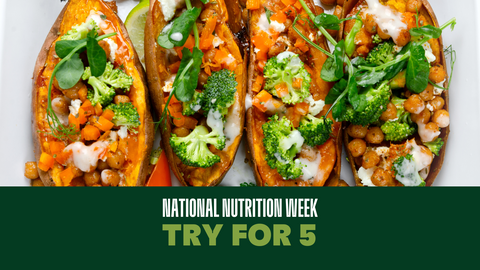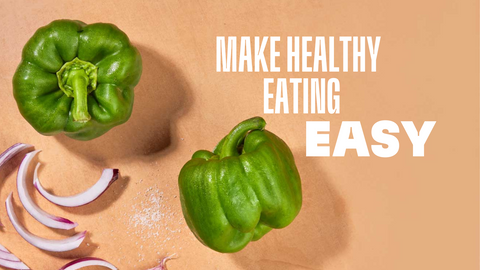Try for 5
Try for 5 is an annual awareness campaign by Nutrition Australia during National Nutrition Week in October that celebrates vegetables and the important role they can play in our health and wellbeing. With only 7% of adults and 5% of children eating the recommended servings of vegetables each day, Nutrition Australia created the campaign to raise awareness of the benefits of eating vegetables. In this month’s blog our resident nutritionist Nicky delves a little deeper into why eating more vegetables is important for our overall health and how you can get them in!
What are vegetables?
A vegetable is broadly defined as a plant or part of a plant that is eaten as food. They can be grouped according to the edible part of each plant:
- leaves (lettuce)
- stalks (celery)
- roots (carrot)
- tubers (potato)
- bulbs (onion)
- flowers (broccoli) and
- Legumes (beans)
How many vegetables are we meant to be eating?
A serving of vegetables is equivalent to: ½ cup cooked vegetables, corn or legumes, 1 cup salad, ½ medium potato or 1 medium tomato .
The MINIMUM recommended number of serves of vegetables per day is;
- 2-3 serves for children aged 1-2
- 2.5 for children aged 2-3
- 4.5 for children aged 4-8
- ~ 5 for 9yrs +++
Are they actually that important for our health?
Vegetables are healthy as they contain a perfect mix of health-enhancing nutrients that work together to improve our health. These include vitamins, minerals, plant chemicals (antioxidants) and fibre.
It was estimated that almost 4 million deaths worldwide were attributable to an inadequate intake of fruit and vegetables in 2017. Often research looking at the health benefits of vegetables tends to lump them in with fruit. However, it is clear that the higher your vegetable intake the lower your risk of high blood pressure, stroke, heart disease, type two diabetes, early death and some types of cancers including colorectal cancer and gastric cancer, and even a reduced risk of osteoporosis. When included as part of a healthy overall dietary pattern they may also reduce your risk of Dementia and depression, improve skin and psychological well being, protect against weight gain and reduce levels of inflammation in the body
How can you get more vegetables in?
Once you make a conscious effort to get more vegetables in, it really isn’t too hard to hit your five serves. Here are some easy tips
- Add a small can of tinned chickpeas, lentils or 4 bean mix to your salads
- Substitute 50% of your mince in a bolognese dish for tinned brown lentils
- Swap your deli meat at lunch for some falafels
- Swap wheat pasta for a legume based pasta
- Add vegetables to your omelettes like chopped mushrooms, tomato and spinach
- Instead of a jar of pasta sauce make a vegetable ratatouille with your left over veg in the fridge. Add some fresh or tinned tomatoes and blitz it up into a pasta sauce
- Dedicate one or two nights per week to a meat-free meal that heroes vegetables
- Buy some extra salad kits and add these to your lunches or dinners
- If you cook rice stir through some frozen peas, corn and carrots 5 minutes before its done
- Roast a batch of vegetables in extra-virgin olive oil and use these throughout the week in omelettes, on sandwiches or wraps and in salads
- Looking for a quick dinner? Grate up your favourite vegetables and add some
- Aim for 50% of your main meals to be salad or vegetables and aim for 3 different colours
Activate Foods has a wide range of vegetarian and vegan ready made meals that hero vegetables. Adding a few of these into your diet is an easy and delicious way to boost your vegetable intake. They also offer a family side of fresh steamed vegetables and fresh roasted vegetables which are so convenient to have in the fridge. All you need to do is quickly cook up a protein like some chicken, seafood, meat or tofu.


